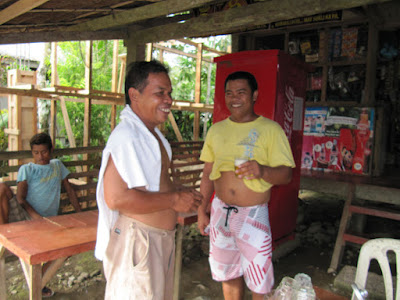Elections are a big deal in the Philippines. I would guess nearly 100% of Filipinos turn up at the polls. Here, election season can also turn violent. During the period leading up to an election, my bags were routinely checked before entering a tiny shop. My hosts also insisted on escorting everywhere, even just to walk down the humble road near the home. Among my hosts was Amelito Cadao who is a Counselor of the Pisaan Baranguay (a local voting district in the Philippines) in San Francisco and was running for re-election. To illustrate the danger present even in this seemingly peaceful place, he told me that as long as I am in his baranguay, he could have armed men at my defense. If I left the baranguay, he could do nothing.
Meet Amelito, Counselor of Pisaan Baranguay
Politicians in the provinces are simple people. Amelito lived with his family in the tiny basement of the home where I stayed. When I entered his home, carrying the dinner Jimmy had bought for me at Jollibee, I had tread carefully over the dips in the unfinished floor. The total square footage was roughly equal to that of my bedroom upstairs. It consisted of a long narrow dining and kitchen area, with two tiny bedrooms along side it which were barely bigger than a large bathroom. There was no toilet, or CR (Comfort Room), as the Filipinos refer to it.
 |
| Amelito (left) takes a break from campaigning to enjoy videoke. |
I didn't see much of him for most of the week, as he was busy campaigning. He had no funds and ran his campaign entirely on foot, along with a group of his supporters. In this place, there are no television ads. There are posters everywhere, but they are all the same. Each poster consists of a photo of the candidate and his name. They hang like streamers across the driveway leading up to Pisaan Elementary School, where the votes are caste.
 |
| Atoy (in green) and his daughter Joi Joi at the Pisaan Elementary School, where voting took place. |
 |
| Posters of the candidates hang like streamers to greet voters on the driveway of the school. |
Election day is considered a holiday in the Philippines. Many shops and businesses are closed. The grocery store remained open, but the law prohibits the sale of alcohol on the day of the election.
 |
| Langh Langh (in blue) scans for her name outside each classroom to figure out where to vote. Her daughter Joi Joi is in pink. |
The voting process here is simple, yet complicated. Each classroom has an alphabetical list of names on the door. Each person must find the right room to vote by looking at the list. Strangely, the rooms themselves are not in alphabetical order, so the "B" classroom is not necessarily next to the "A" room. When asked what I thought of the process, one of my first comments was to note the lack of labeling on the rooms. A simple print out of a big "S-T", for instance, would have greatly facilitated the process and eliminated unnecessary crowding.





I wish for a better, peaceful and fair Election this 2013.
ReplyDelete